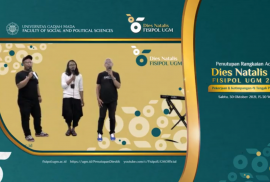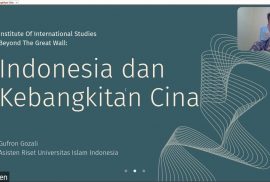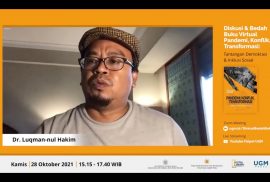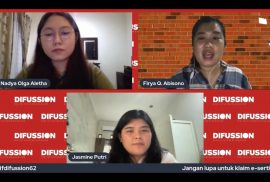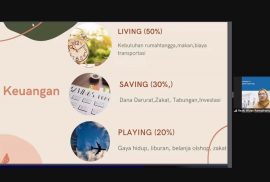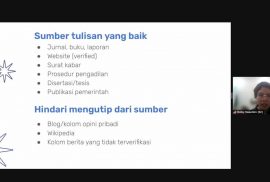Yogyakarta, October 30th 2021─The Faculty of Social and Political Science (Fisipol) UGM held the closing ceremony of the 66th Dies Natalis online through zoom and youtube streaming. The event invited several stars like Umar Haen, Yusril Fahriza, Duo Nillo, and was hosted by Gundhi Sos and Om Dibyo. The theme used by the celebration was job and inequality in the midst of the pandemic. The event was also meant to be an online reunion event for Fisipol UGM alumni. Even though it was held virtually, the event was quite festive and it was attended by dozens of people through zoom and hundreds of people also watched through Fisipol UGM youtube channel.
News
Yogyakarta, October 29th 2021─The Institute of International Studies or IIS of the Department of International Relations (DIHU_ of UGM held its 17th Beyond the Great Wall on Friday (29/10). Beyond the Great Wall is a routine activity held by IIS HI UGM to invite researchers and academics from all walks of life to discuss issues related to China. Presenting two speakers in the discussion entitled “Contemporary China: Revival in the Gap”, Beyond the Great Wall #17 is a space for dialogue to discuss the impact of China’s rise in various aspects, both at the national level – the Chinese state itself, and globally – in particular. Indonesia.
Yogyakarta, October 28th 2021─The Library of Faculty of Social and Political Sciences of UGM in collaboration with the Center for Security and Peace Studies, and UGM Press, held a virtual book review “Pandemic, Conflict, Transformation: Challenges of Democracy and Social Inclusion” on Thursday (28/10). The book, which was officially released on August 30, is the result of a collaboration between the Center for Peace and Security Studies or PSKP with the Masters in Peace and Conflict Resolution and The Asia Foundation through the Peduli Program.
The material presentation is divided into two parts, namely ethical aspects and consumer protection in advertising on social media, and deep sexism in the public digital space. Nadya explained, Data Reportal research found that social media users had reached 4.55 billion worldwide. In addition, the potential for advertising on Facebook reached 2.28 billion, Instagram 1.39 billion, and Facebook Messenger 1.09 billion. Comparison of ad penetration rates with active users shows a change in the function of social media.
Yogyakarta, October 27th 2021─The Career Development Center of Fisipol UGM held a financial literacy webinar titled “The Financial Lives of Millennials” on Wednesday (27/10). The event was held through the Zoom meeting and invited Rezki Wulan Ramadhanty, M.Sc, the CEO of Womenpreneur Financial School, to be the speaker.
The webinar was divided into two sessions; the material sharing session and the question and answer session. In the material sharing session Rezki talked about the mindset of being financially literate and tips on managing finances for millennials. According to her, we have to have a growth mindset which means that we need to think about developing and opening ourselves up for new opportunities. Additionally, we also have to be ready to accept new challenges and learn new things that we didn’t know before.
Yogyakarta, October 26th 2021─The Academic Innovation Unit of FISIPOL UGM held a Student Workshop program with the theme “References and Citations in Academic Writing” on Tuesday (26/10) afternoon. This event invited speaker Sri Handayani Nasution, project officer of the CfDS of UGM’s research division.
As a student, citations are important to know in academic writing. A citation is a reference or citation that allows us to acknowledge the sources that have been cited. Citation is useful for verifying the data obtained so that our writing can be accounted for and has accountability. The form of citations can be in the form of body text and footnotes. While the variety of citation styles that are quite familiar are APA style and MLA style.
Yogyakarta, October 26th 2021─To celebrate World Mental Health Day on October 10th, the peer counselors from the Career Development Center (CDC) FISIPOL UGM held an event titled “Mental Health Society (MHS)” that is aimed to increase society’s awareness, especially university students’, about the importance of taking care of our body and mind in order to be healthy. With the theme of “Be Mentalsafe, Be Covidsafe”, MHS 2021 underlined the urgency of mental and bodily health in the midst of the COVID-19 pandemic.
Yogyakarta, October 26th 2021─The Department of Governmental Politics (DPP) Fisipol UGM held a public lecture of research methods with two topics which are political ethnography and discourse analysis. The event was held with two speakers; Dr. Laksmi Savitri from the Research Fellow at Centre of Transdisciplinary and Sustainability Science (CTSS) IPB who talked about political ethnography as well as Dr. Budi Irawanto as a UGM Communication Studies Lecturer as the speaker for discourse analysis method. On this occasion, the political ethnography lecture was moderated by Dr. Amalinda Savirani, and the discourse analysis lecture by Dr. Joash Tapiheru, who are both lecturers in DPP Fisipol UGM. The event was held online and was attended by 40 people. The material covered in this public lecture was about the different aspects of education, especially data mining in the doctorate political science program.
Yogyakarta, October 26th 2021─The Center for Digital Society held a Digital Discussion #57 program entitled “SEO Content Writing 101” on Tuesday (26/10) night. The discussion took place through the Telegram group and featured a speaker from Niagahoster’s SEO Content Editor, Imas Indra.
Niagahoster is one of the best web hosting services in Indonesia, which has served 500+ thousand customers to go online through the website. Simply put, web hosting is a server rental platform for storing website data. One of the digital marketing strategies used by Niagahoster is SEO. SEO or search engine optimization are ways that are done so that websites and their content can appear on page #1 of Google. “This strategy really works, starting from getting millions of traffic, leads, sales, to being top of mind in the hosting industry. It’s not surprising either. In general, 93% of online activity starts from Googling. If the execution is right, SEO also helps increase the conversion rate to 14.6%,” Imas said.
Yogyakarta, October 25th 2021─The Department of Governmental Politics (DPP) Fisipol UGM collaborated with the Faculty of Social and Political Science (Fisipol) UGM, and UGM Press by creating a book review webinar for the book ‘On Power’. The event was held virtually by inviting four lecturers of DPP Fisipol UGM as speakers which are Dr. Wawan Mas’udi, Dr. Evi L Sutrisno, Dr. Amalinda Savirani, and Dr. Joash Tapiheru.With 250 attendants, the event was moderated by Desi Rahmawati as a Researcher in Fisipol UGM Polgov. The webinar talked about a lot of important topics in the ‘On Power’ book starting from the research scope in governmental studies to methodologies and reaching methods used.

